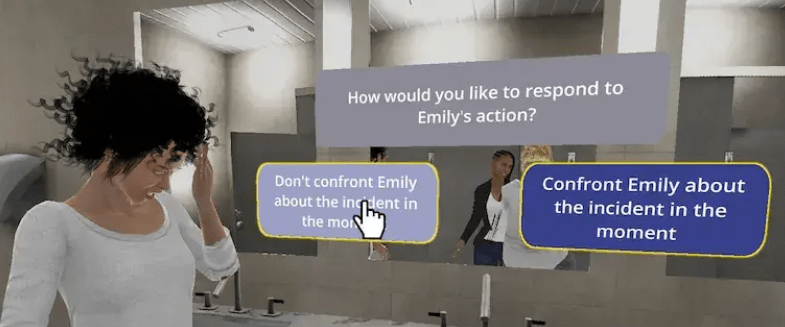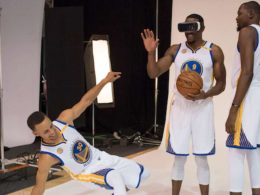American start-ups want to use virtual reality (VR) in employee training programmes to convey more impressively what harassment, discrimination and racism can do to those affected - and how to react to it correctly.
Harassment in the workplace is still a problem. "This here is Katrina, our junior engineer," an employee introduces his colleague to a new employee in the canteen. "You'll see a lot more of her, just don't be distracted by her pretty looks." The new colleague replies with a wink: "Oh yeah? I hope I see more of your pretty face." The situation is uncomfortable - especially if you're in the woman's shoes. And that's exactly what you do.
The interview is part of a virtual reality simulation designed to sensitise employees to sexual harassment in the workplace.
Simulations are based on real experiences in the workplace
Numerous companies such as the start-up Sisu VR now offer employee training in virtual space. Employees put on a headset and disappear into a fictitious scene in the workplace where someone is being harassed or insulted. Sometimes you slip into the role of the victim, sometimes into that of the perpetrator, sometimes you mimic an uninvolved colleague. If you look down at yourself, your own arms, clothes and voice are suddenly those of the character in question.
The scenes take place in recreated workplaces: a virtual open-plan office, the cafeteria, the skyline behind the virtual windows is reminiscent of San Francisco or New York. The situation is intended to look as everyday as possible when you have to make decisions in individual cases: What do you say to your colleagues? Do you say nothing? Do you contact the HR department?
Employee training is often surprisingly old-fashioned
Today, almost all large companies in the United States require their employees to attend regular training courses on how to recognise and deal with harassment, bullying or discrimination in the workplace. In the past, these trainings took place with textbooks and VHS films, then Power Point presentations and video clips were added. But even in 2022, such training is often surprisingly old-fashioned. The multiple-choice questions, which are designed to force employees to listen, can often be answered without really paying attention, say employees.
"Most employees don't like employee training," says the founder of Sisu VR, Jocelyn Tan, in an interview, "we wanted to revolutionise the field." All the case studies in the virtual training courses are based on real experiences of women in everyday working life, which Tan collected in interviews: sexist remarks about a colleague's appearance, inappropriate invitations for after-work hours, nasty emails, attempts at physical advances. The #MeToo movement inspired her to come up with the company idea, says Tan, a trained engineer in Silicon Valley.
Virtual reality should convey empathy
VR is not intended to denounce anyone, but to empathise with employees by allowing them to experience the world of work through the eyes of others. No other training method is as good as VR at making someone feel like they are really experiencing a fictional situation, says Morgan Mercer, founder of the Los Angeles-based start-up Vantage Point. Similar to Sisu VR, the employees in Vantage Point's training courses first slip into a VR headset and thus into the role of the victim, the "perpetrator" or an uninvolved observer; however, the situations here are recreated by actors and not avatars. "We believe that these topics are too important to be communicated using cute animated avatars," says Mercer. Afterwards, the employees discuss their impressions together and set goals for how they can transfer what they have learnt to their day-to-day work. The training is repeated every few months.
Vantage Point has now raised 4.25 million dollars in investor funding, is active in 30 countries and counts large companies - including Swiss ones - among its clients. The company also offers simulations designed to sensitise employees to discrimination on the basis of ethnicity or disability.
At the startup Praxis Labs, employees also slip into the skin of animated avatars, but they don't just have to click on their answers with the joystick, they have to speak them out loud. This is intended to make the simulation as realistic as possible, explains co-founder Elise Smith to the "Washington Post". "By creating opportunities to intervene in tricky situations, we are helping to change how people behave in the real world." Uber, Ebay, Amazon and Google have already trialled the New York-based company's training courses. Last year, the start-up raised 3.2 million dollars in venture capital.
There is a risk of reviving a trauma
However, critics point out that it could be traumatising for employees who have already been harassed at work if they have to go through a similar situation again in virtual reality.
Sisu VR points out this danger at the beginning of its training programme. Vantage Point says that this is precisely why sociologists and psychologists were involved in the creation of the simulations. Employees also have the opportunity to slip into the role of an uninvolved observer if they prefer.









